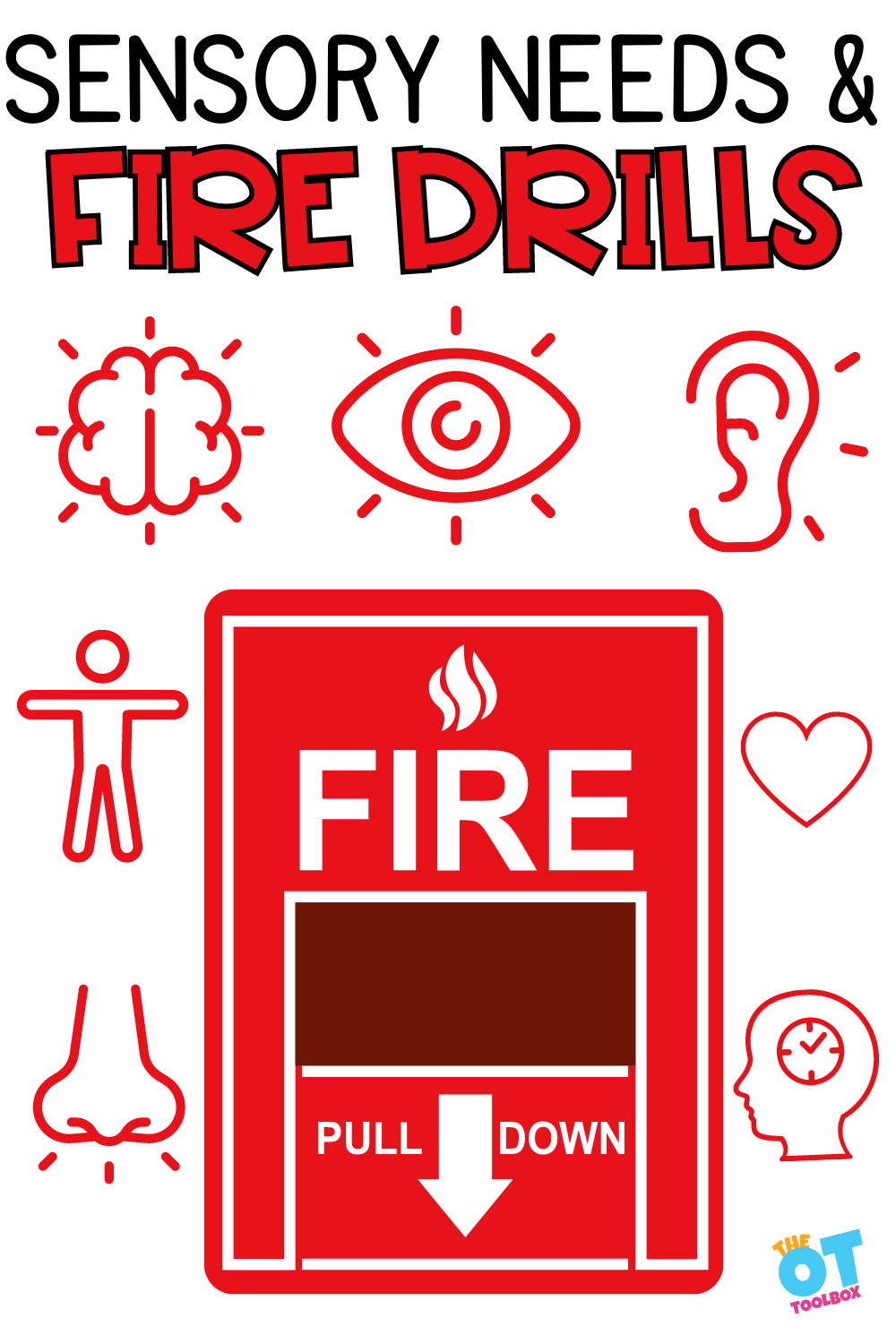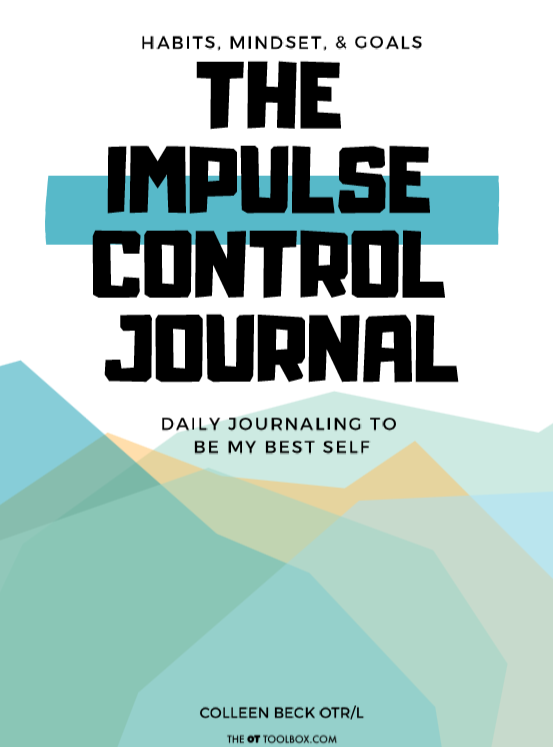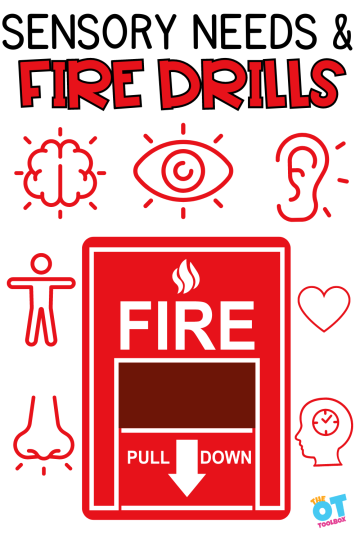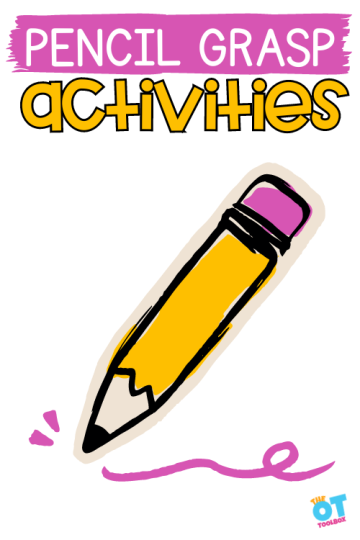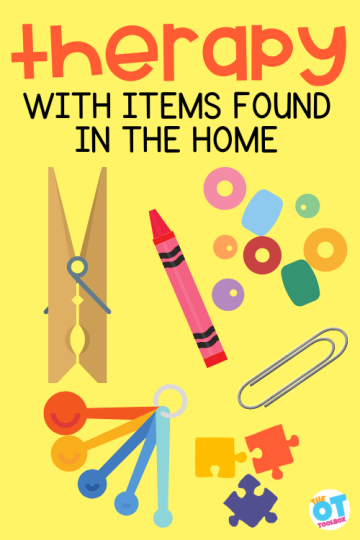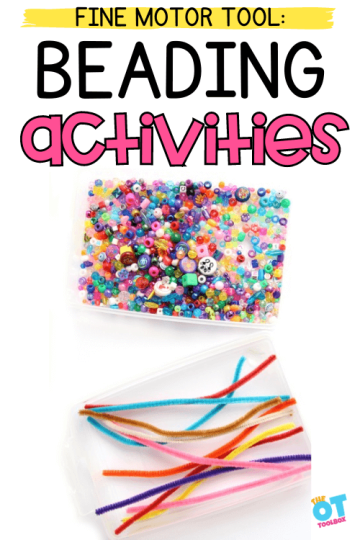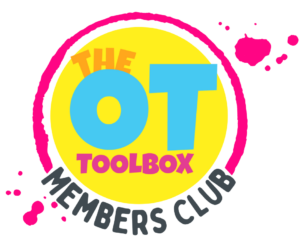Everyday, social skills are a part of every interaction we have with other people. Today, I have a social skills checklist that can be used to identify areas of difficulty and areas of successes related to social interactions, social emotional development, and a way to identify specific areas that impact in social emotional learning. This list of social skills for children can be helpful in breaking down social learning and social skill development.
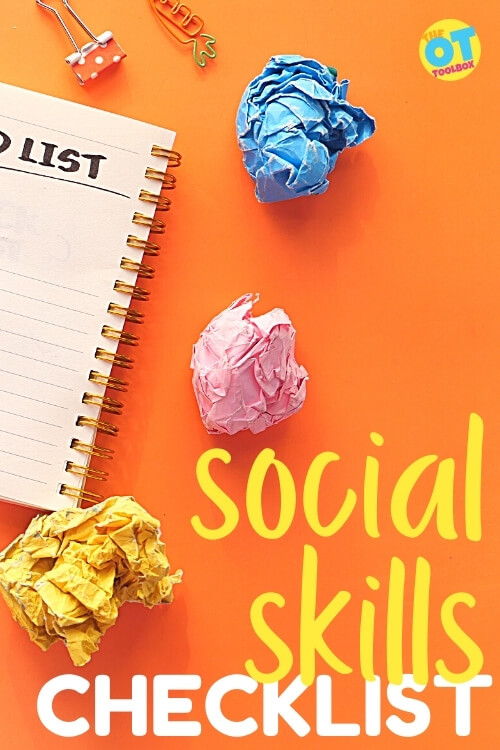
Social Skills Checklist
Before we get to the social skills checklist, let’s break down social skills into the components.
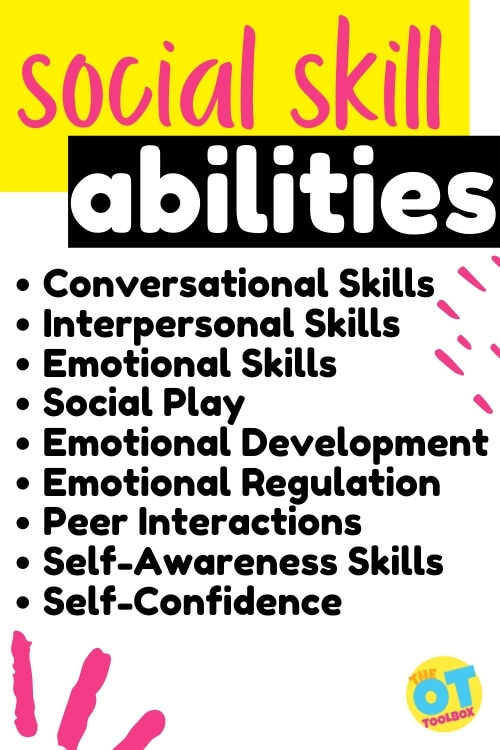
Included in this checklist are the individual components of social emotional skill areas, or social abilities:
- Conversational Skills
- Interpersonal Skills
- Emotional Skills
- Social Play
- Emotional Development
- Emotional Regulation
- Peer Interactions
- Self-Awareness Skills
- Self-Confidence
You’ll see each of these social and emotional skills areas listed below with a checklist of each area related to social emotional learning. Use this list of social skills to support social emotional development in children.
How to Use a Social Skills Checklist
When we can identify specific aspects of our behavior and actions related to what’s happening around us, we can identify specific thoughts feelings, reactions and responses that impact our interaction in the environment and with others.
Having an awareness of each aspect of social and behavioral responses and internal thinking is a helpful place to start when it comes to promoting social emotional development. Then, we can know where to start by identifying specific areas of need in kids.
By helping individuals identify aspects of social skills, observing social emotional skills in others, identifying expected and unexpected behaviors, we can help the kids we serve to notice and the impact they have on others’ thoughts, emotions, reactions and responses.
By having individuals observe their own behavior, they can recognize how it impacts others, how it impacts participation in functional tasks in various environments, and they can make the connection between emotions, regulation, social skills, and functioning.
A Note About this Social Skills List
Remember that all children develop differently, and when it comes to social emotional learning, there is a close compont of executive functioning. Executive functioning skills down’t fully develop until adulthood. And so, social skill development can occur through adulthood as well.
This list of social skills is meant to be comprehensive. Not all aspects of social skills will be achieved and steps can be skipped or developed in various orders based on experiences. In general, the lists are written in a developmental order, but the segments of social skills (Conversational skills, Interpersonal skills, Emotional Skills, Social Play, Emotional Regulation, Peer Interactions, Self-Awareness skill, and Self-Confidence) can all be developing and occurring at once. These social abilities are all happening at once and are fluid in development.
Use this social skills checklist to identify areas of development, including self and social awareness in one-on-one tasks, peer tasks to function, learn, and play.
conversational Skills
Conversational skills occur throughout almost all functional tasks and environments. From the home, to school, to the community, conversational skills are needed for social interactions all day long.
- Participates in conversation (verbal and/or non-verbal)
- Responds to yes/no questions
- Answers questions
- Initiate conversation when it is appropriate to do so
- Initiates conversation around specific topic
- Adds to a conversation around a specific topic
- Asks questions around a specific topic
- Responds to questions around a specific topic without getting off track
- Makes a variety of comments, related to the topic, without getting off track
- Ends conversations appropriately
- Waits to interject in a conversation
- Maintains appropriate proximity to conversation partner
- Recognizes the facial expressions of others
- Recognizes the nonverbal cues, or “body language” of others
- Requests assistance from others when needed
- Understands the jokes of others
- Maintains eye contact during conversations (able or unable)
- Maintains an appropriate distance when interacting with peers
- Speaks at an appropriate volume in conversations
- Speaks at an appropriate volume on virtual/digital conversations online or via a device
- Considers the perspective of others
- Notices when others may be struggling
- Offers assistance to others
- Verbally expresses their feelings
- Responds to greetings expressed by others
- Joins a conversation with two or more people without interrupting
- Maintains back and forth conversation
- Initiates greetings to others
- Provides compliments to others
- Introduces self to others
- Politely asks others to move out of their way
- Acknowledges the Compliments Directed at Him/Her by Others
- Allows Peers to Join Him/Her in Activities
- Responds to the Invitations of Peers to Join Them in Activities
- Allows Others to Assist Him/Her With Tasks
- Responds to Questions Directed at Him/Her by Others
- Experiences Positive Peer Interactions
- Compromises During Disagreements With Others
- Responds Slowly in Conversations
- Changes the Topic of Conversation to Fit Self-Interests
- Misinterprets the Intentions of Others
- Makes Inappropriate Comments
- Engages in Solitary Interests and Hobbies
- Ends Conversations Abruptly
- Fails to Read Cues to Terminate Conversations
- Exhibits Fear or Anxiety
- Regarding Social Interactions
- Experiences Negative Peer Interactions
- Engages in Socially Inappropriate Behaviors
- Exhibits Poor Timing With His/Her Social Initiations
- Is Manipulated by Peers Engages in Solitary Activities in the Presence of Peers
- Conversational skills online in email or text messages
- Conversational skills during times of stress such as tests, games, etc.
Interpersonal skills
Part of interpersonal skills is the self awareness and social awareness involved in peer interactions. Interpersonal skills refers to interacting with others in social situations, classrooms, homes, and the community. Also involved is interpersonal skills on a digital manner, which is a new ballgame for many adults who are raising children in this digital era.
Types of Interpersonal Skills
Interpersonal skills can be broken into several areas:
- Listening
- Collaboration
- Empathy
- Problem solving
- Conflict resolution
- Constructive feedback
- Diplomacy
Interpersonal skills enable us to interact with others. These social skill checklist includes aspects of interpersonal skills.
- Introduces him/herself to someone new
- Introduces people to each other
- Makes eye contact (if able/willing)
- Uses manners
- Problem Solving related to others in a specific situation
- Referring back to previous situations where they needed to use problem solving (working memory)
- Seeks help from peers in a one-on-one setting
- Seeks help from peers in a group setting
- Seeks help from adult
- Accepts consequences
- Plays a game successfully
- Wins a game with appropriate behavior
- Wins a game with appropriate conversation to others
- Loses a game with appropriate behavior
- Loses a game with appropriate conversation to others
- Responds to constructive criticism
- Shows self-confidence in group situations
- Shows self-confidence in one-on-one situations
- Shares with others (when appropriate)
- Shows ability to compromise
- Shows ability to cooperate on a problem
- Shows ability to cooperate on a disagreement
- Listens to others
- Takes turns
- Uses personal space
- Respects the personal space of others
- Follows directions in a given situation
- Works with others to follow directions as a group (walking on one side of the hallway)
- Identifies/defines problems
- Generates solutions to problems
- Carries out solutions by negotiating or compromising
- Understands impact his/her behavior has on peers
- Interprets body language in others
- Interprets or recognizes body language in self
- Clearly communicates
- Offers constructive feedback to others in a one-on-one basis
- Offers constructive feedback to others in a group setting
- Responds to constructive feedback from others in a one-on-one setting
- Responds to constructive feedback from others in a group setting
- Offers input to problem solve
- Accepts input from others to problem solve
- Uses given information to problem solve with flexibility
Emotions and Social Skills
- Understanding emotions in general
- Identifies emotions in others
- Identifies emotions in self
- Able to identify a potential reason for emotional displays in others
- Able to identify a potential reason for emotional displays in self
- Justifies emotions once identified
- Able to regulate emotions with appropriate responses
- Displays empathy towards others
- Displays a variety of emotions
- Identifies likes and dislikes
- Demonstrates affection and empathy toward peers
- Refrains from aggressive behaviors toward peers
- Refrains from aggressive behaviors or self-talk toward self
- Identify emotional state during a conversation or situation
- Uses different tones of voice to convey messages
- Compliments others
- Appropriately receives compliments
- Asks for a favor appropriately
- Apologizes independently
- Says thank you
- Gives compliments to peers
- Gives compliments to adults
- Flexibility
- Accepts making mistakes without becoming upset/angry
- Accepts consequences of his/her behavior
- Accepts unexpected changes
- Continues to try when something is difficult
- Ignores others or situations when it is desirable to do so
- Conversational Skills
- Problem Solving
- Compliments
- Flexibility
SOCIAL PLAY AND EMOTIONAL DEVELOPMENT
Beginning Play Behaviors
- Maintain proximity to peers within 1 foot
- Observe peers in play vicinity within 3 feet
- Parallel play near peers using the same or similar materials (Playing alongside a peer with own toys or games)
- Imitate peer (physical or verbal)
- Take turns during simple games (e.g., rolling ball back and forth). We have a great resource on teaching turn taking skills.
Intermediate Play Behaviors
- Play associatively with other children
- Shares toys during play
- Changes play with flexibility
- Respond to interactions from peers such as accepting a toy from a peer;
- Answers questions during play
- Return and initiate greetings with peers (e.g., wave or say “hello”).
- Know acceptable ways of joining in an activity with others (e.g., offering a toy to a peer or observe play and ask to join in).
- Invite known peers to play
- Take turns during structured games/activities (social games or board games)
- Ask peers for toys, food, and materials
Advanced Play Behavior
- Play cooperatively with peers
- Game play with rule following
- Game play with problem solving when rules are broken
- Make comments about what he/she is playing to peers
- Organize play by suggesting play plan
- Plays the role of a leader during peer play
- Follow another peers play ideas
- Plays the role of a follower during peer play
- Turn taking during structured activities
- Take turns during unstructured activities
- Invites unknown peers to play (age-appropriate unknown peers in settings such as playgrounds)
- Give up toys, food and materials to peers
- Offer toys, food, and materials to peers
EMOTIONAL REGULATION
Emotional regulation is broken down into several areas when it comes to different social skills. this includes internal self-regulation as well as self-regulation during peer interactions, group interactions, problem solving, and flexibility of emotional regulation. A component to these concepts is working memory.
In these ways emotional regulation is related to executive functioning skills.
- Understanding emotions
- Identify likes and dislikes
- Identify emotions in self
- Label emotions in self
- Identify emotions in others
- Label emotions in others
- Justify an emotion once identified/labeled
- Demonstrate affection toward peers
- Demonstrate empathy toward peers
- Ability to demonstrate intense fears
- Uses tone of voice to convey a message
Self Regulation and Social Skills
- Allow others to comfort him/her if upset or agitated
- Self regulate when tense or upset (using self-regulation skills independently)
- Self regulate when energy level is high (using self-regulation skills or strategies)
- Use acceptable ways to express anger or frustration (e.g., states they are upset or asks to take a break)
- Deal with being teased in acceptable ways (e.g., ignore, walk away, tell adult)
- Deals with being left out of group
- Request a “break” or to be all done when upset
- Accept not being first at a game or activity
- Say “no” in an acceptable way to things s/he doesn’t want to do
- Accept losing at a game without becoming upset/angry
- Deals with winning appropriately
- Deals with losing appropriately
- Accept being told “no” without becoming upset/angry
- Able to say “I don’t know.”
Flexibility of social interactions
- Accept making mistakes without becoming upset/angry
- Accept consequences of his/her behaviors without becoming upset/angry
- Ignore others or situations when it is desirable to do so
- Accept unexpected changes
- Accept changes in routine
- Continue to try when something is difficult
Problem Solving in social situations
- Claim and defend possessions.
- Identify/define problems.
- Generate solutions using working memory or with innovative thought generation
- Carry out solutions by negotiating or compromising
- Seek assistance from adults
- Seek assistance from peers
- Give assistance to peers
- Identify when assistance is needed for self
- Identify when assistance is needed by others
Self-Regulation and Group Interactions
- Participate in group interactions
- Respond/participate when one other child is present.
- Respond/participate when more than one other child is present.
- Respond/participate in a group of children WITHOUT adult supervision
- Respond/participate in a group of children WITH adult supervision
- Use appropriate attention seeking behaviors (e.g., calling name, tapping
- shoulder).
- Follows the rules of a group
- Remain with group during group tasks
- Follow the group routine
- Follow directions during group settings
- Make transition to next activity when directed
- Accept interruptions/unexpected change
- Take turns with others in group settings
- Work collectively as a group to solve a problem
- Interact with group members
- Refrain from breaking off into smaller groups
- Refrain from gossip or turning other group members against one another
Peer Interactions
- Invites peers to join them in activities
- Joins peers in activities
- Takes turns during games or activities
- Takes turns in situations such as waiting in line, using the bathroom etc.
- Maintains personal hygiene
- Interacts with peers during unstructured activities
- Interacts with peers during structured activities
- Asks questions about others
- Asks questions to to continue a conversation
- Engages in one-on-one interactions with peers
- Interacts in groups of peers
- Maintains the “give-and-take” of conversations
- Expresses sympathy for others
- Expresses empathy for others in conversation
- Expresses empathy for others in action
- Acknowledges the interests of others
- Limits negative conversations about others
- Responds to negative conversations about others
Self-Awareness Skills
Self-awareness is an important part of social emotional learning and development of social skills. Self-awareness refers to the ability to understand one’s own emotions, thoughts, and values. This ability to be self-aware influences how an individual responds to situations. Self-awareness also impacts behaviors.
Self-awareness is greatly related to emotional regulation, the limbic system, and fight/flight/freeze concepts.
Self-awareness involves body awareness, confidence, an awareness of interests, strengths, and weaknesses in given tasks.
Self-awareness skills include:
- Identifying personal strengths
- Identifying personal weaknesses
- Identifying one’s emotions
- Identifying and developing interests, likes, and dislikes
- Demonstrating an awareness of feelings and values
- Having self-confidence
- Understanding the concept of over-confidence
- Being able to differentiate between abilities and inabilities
- Examining prejudices and biases
- Experiencing self-efficacy
- Having a growth mindset
Social Confidence
It’s through the development of self-awareness skills that social confidence forms. When we are able to be aware of ourselves and build in the areas listed above, confidences in our abilities to react, respond, and use regulation strategies follow. This is one aspect of social confidence.
Another aspect of social confidence refers to develop self-esteem and an ability to interact with others in a variety of situations. This can happen in established friendships, new friendships, established and known settings, and new or novel settings.
Social confidence refers to these aspects of social skills:
- Having confidence in our emotional response
- Being yourself
- Participating in new settings
- Participating in new activities
- Reaching out to others who the child doesn’t know
- Participating in activities even through there is a chance of failure
- Trying again after failure
- Learning new things
- Being supportive to others
- Not worrying about what others think of one’s actions
- Not worrying about what others may think of one’s behaviors
How to promote Social Skills in Kids
Take a look at the lists of specific social skills in this checklist. It is hard to think of any daily task that doesn’t require some aspect of social skill development. From interacting with family, the community, peers, there are tasks occurring all day long that require social skills.
Use this social emotional learning worksheet to work on identifying emotions and to drive social skill development.
Use these social development toys to promote social skill progression.
For more ways to pinpoint areas of development in kids, try the Impulse Control Journal. This comprehensive resource outlines daily interactions and allows children to identify how they’ve behaved or responded to situations.
Children can identify aspects of social situations that have worked well, and aspects that they can improve upon.
The Impulse Control Journal has activities and tools to support and develop mindset, habits, goals, interactions, working memory, and much more.
Click here to get your copy of this resource today.
The Impulse Control Journal…a printable resource for helping kids strategize executive functioning skill development. When saying “calm down” just isn’t enough…
When a child is easily “triggered” and seems to melt down at any sign of loud noises or excitement…
When you need help or a starting point to teach kids self-regulation strategies…
When you are struggling to motivate or redirect a child without causing a meltdown…
When you’re struggling to help kids explore their emotions, develop self-regulation and coping skills, manage and reflect on their emotions, identify their emotions, and more as they grow…
Grab the Impulse Control Journal to build organizational strategies, planning, prioritization, habits, and mindset in kids.
Another fantastic resource that can help develop social and emotional skills is the activity book, Exploring Books Through Play.
This digital E-BOOK is an amazing resource for anyone helping kids learn about acceptance, empathy, compassion, and friendship. In Exploring Books through Play, you’ll find therapist-approved resources, activities, crafts, projects, and play ideas based on 10 popular children’s books. Each book covered contains activities designed to develop fine motor skills, gross motor skills, sensory exploration, handwriting, and more. Help kids understand complex topics of social/emotional skills, empathy, compassion, and friendship through books and hands-on play.
The book Exploring Books Through Play, has 50 different activities based on popular children’s books. Each book is used for 5 different activities that cover a variety of areas: sensory play, crafts, gross motor activities, fine motor activities, handwriting, scissor skills, and so much more.
This book is designed to address emotional regulation and connecting with kids.
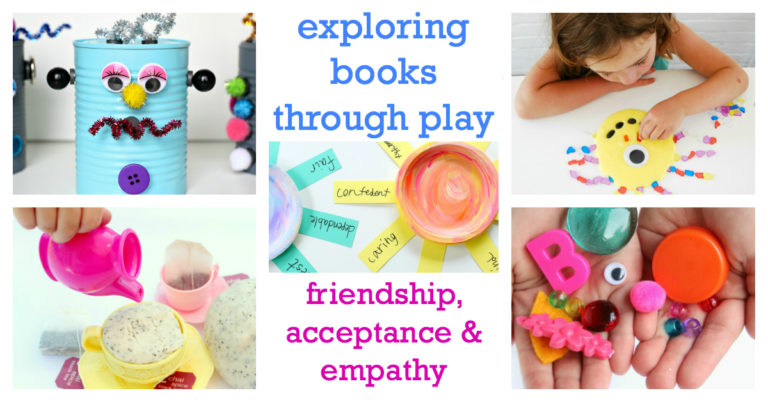
WHAT’S INSIDE EXPLORING BOOKS THROUGH PLAY?
We have handpicked these easy and hands-on activities to help kids develop essential social emotional learning skills.
As classroom curriculum becomes more focused on academics, social and emotional development can get lost in the shuffle. This book focuses on abstract concepts of friendship, acceptance and empathy. By using children’s books that foster understanding of these concepts through pictures and stories, we can help children understand and see these emotions in action. What if you could use books and interactive activities to teach friendship? What if you could read a book that centers on accepting differences and create or make an activity or craft that helps children see acceptance in action. What if you could explore emotions through story and interactive play? In this book, you will find books that cover abstract concepts and use play to build social and developmental skills. The 10 books covered include:
- A Sick Day for Amos McGee
- Boy + Bot
- Little Blue and Little Yellow
- Red: A Crayon’s Story
- Chrysanthemum
- The Day the Crayons Quit
- Leonardo the Terrible Monster
- The Adventures of Beekle: The Unimaginary Friend
- Whoever You Are and Penguin and Pinecone
Want to help kids learn more about complex concepts such emotions, empathy, compassion, and differences?
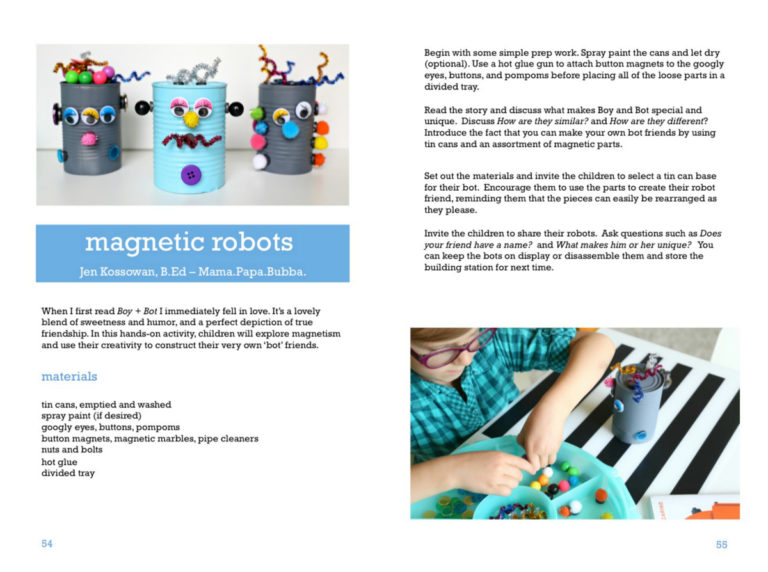
Exploring Books Through Play uses children’s literature as a theme to engage in fun, hands-on activities that help children and adults delve deeper into the characters and lessons, bringing the stories to life and falling further in love with literature. Read a story and then bring the characters to life while learning and building skills. Each story offers unique activities designed around central themes of friendship, empathy, and compassion.
Each chapter includes 5 activities for each of the 10 children’s books. The activities are perfect for children ages 3-8, can be used in small groups or as a whole class, and are easily adapted to a home or classroom setting.
Click here to get the Exploring Books Through Play resource.
A final note on social skills lists
These social skills checklists are to be viewed as educational and informative resources. If you suspect a child or individual of any age has trouble or regressions in any of the areas listed, be sure to seek out individualized support via a pediatrician, therapist, or other professional.
In addition, for the toddler-aged children, changes, regressions, or lack of development as typically expected when it comes to social and emotional skill achievement can be a toddler behavior red flag that should be explored in greater detail.

Colleen Beck, OTR/L has been an occupational therapist since 2000, working in school-based, hand therapy, outpatient peds, EI, and SNF. Colleen created The OT Toolbox to inspire therapists, teachers, and parents with easy and fun tools to help children thrive. Read her story about going from an OT making $3/hour (after paying for kids’ childcare) to a full-time OT resource creator for millions of readers. Want to collaborate? Send an email to contact@theottoolbox.com.

